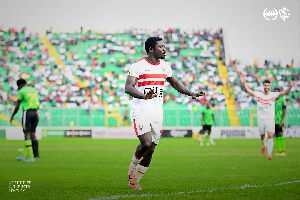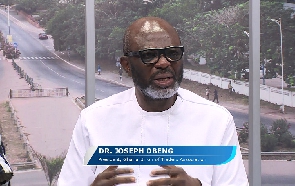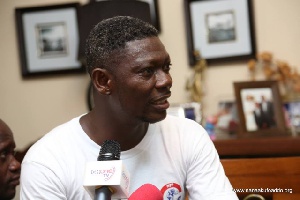- Home - News
- TWI News | TV
- Polls
- Year In Review
- News Archive
- Crime & Punishment
- Politics
- Regional
- Editorial
- Health
- Ghanaians Abroad
- Tabloid
- Africa
- Religion
- Election 2020
- Coronavirus
- News Videos | TV
- Photo Archives
- News Headlines
- Press Release
Soccer News of Sunday, 19 November 2000
Source: African Soccer Magazine
Attuquayefio Flies The Flag For African Coaches
 With his appointment as head coach of his country's national team, the Black Stars, Ghana's Cecil Jones Attuquayefio has joined the growing club of senior African coaches.
With his appointment as head coach of his country's national team, the Black Stars, Ghana's Cecil Jones Attuquayefio has joined the growing club of senior African coaches.
Like many of his contemporaries, Attuquayefio is a former international who played at the highest level for Ghana. He has since coached various clubs and junior national teams, including most recently top Ghanaian side, Hearts of Oak, who will play the final of the CAF Champions League next month against Tunisia's Esperance Sportive.
Attuquayefio combined this job with coaching the Under-17 national side, the Black Starlets, and won the African championship at that level before winning bronze at the World Cup in New Zealand last year.
Hearts of Oak have won the league title for the fourth year in succession under Attuquayefio, who was appointed in the middle of the club's maiden campaign in the Champions League in 1998.
As star midfielder of the Black Stars in Nations Cup finals in the 1960s, Attuquayefio played against some of the best in the continent, who today are also eyeing a stable appointment as technical advisers or coaches of their countries.
In the final of the 1968 Nations Cup Ghana lost the title as defending champions to a Kalala Muzembe goal that gave Congo Democratic Republic (then Zaire) the trophy for the first time.
Kalala himself became coach of Congo DR four years ago with an appointment as technical director. Kalala was fired after the 2000 Nations Cup along with Lusadisu Mehda, his coach, who succeeded Watunda Iyolo who was part of the bronze medal-winning side in Burkina Faso two years earlier.
That was a typical example of the mixed fortunes suffered by African coaches in their own continent. But even so, more than 20 of the continent's coaches are presently Africans, either from their countries of origin or from somewhere else in the continent.
Uganda's coach, Harrison Okagbue, for instance, hails from Nigeria and survived the stormy seas of criticism to win the inaugural Castle Four Nations trophy last month, beating hosts Kenya and favourites, Ghana.
Although his countryman, Christian Chukwu, was not successful in Kenya and was fired after almost 15 months in the job, a local coach James Sianga has had charge of the Harambee Stars since April.
In Congo DR, it is now Malian-born Mohamed Magassouba who is running the show, in a job he combines with his duties at Daring Club Motema Pembe.
In Togo, Tchanile Gbana, with his experience from the region with Satellite FC of Ivory Coast and ASFAN of Niger, has been given the job of taking the Eagles to the World Cup and Nations Cup finals.
In Cameroon, Jean Paul Akono has been named to take over from Frenchman Pierre Lechantre, who has been reluctantly redeployed as technical director. Lechantre has threatened to quit because of the changes, even though he theoretically remains Akono's senior.
Akono won the Olympic gold medal for Cameroon after leading the Under-23 side to another triumph at the All-African Games in Johannesburg. But it was Lechantre who led the senior national team, the Indomitable Lions, to victory in this year's African Nations Cup.
Mahmoud El Gohary has been in and out as national coach of Egypt more times than most fans can remember, but the fact that the former international is back after a disastrous FIFA Confederations Cup in Mexico, shows the depth of trust and respect from the football federation.
Though indigenous coaches are gradually gaining ground, African federations may have good reasons to hire foreign coaches, and not necessarily on grounds of competence.
It may be convenient, for instance, to have a neutral figure to shoulder the blame when there is a conflict of interest. Dressing room tribal disputes play their part, with foreign coaches less open to accusations of favouritism.
They often find it easier, too, to wring resources out of national governments for support staff and other facilities.
Africa still has its fair share of imported technicians. Frenchman Philippe Troussier and Dutchmen Johannes Bonfrere and Clemens Westerhof have won something approaching glory on African soil.
Germany's Peter Schnittger may not have won an African title, but his 30-year service to the game in the continent earned him a merit award from CAF.
Pierre Lechantre and Clemens Westerhof are the last foreign coaches to win the Nations Cup within the last 10 years. Ivory Coast were champions for the first time in 1992 under Yeo Martial, South Africa also triumphed similarly with Clive Barker and Egypt won it for the fourth time with Gohary, who as a player lifted the trophy over 40 years ago.
But Ghana's four titles were all won with local coaches - three by the legendary Charles Kumi 'CK' Gyamfi and Fred Osam Duodu, who returns to his post as technical director after succeeding Giusseppe Dossena in August.
On those grounds, Jones Attuquayefio is in the right place. But he has a hard act to follow.










